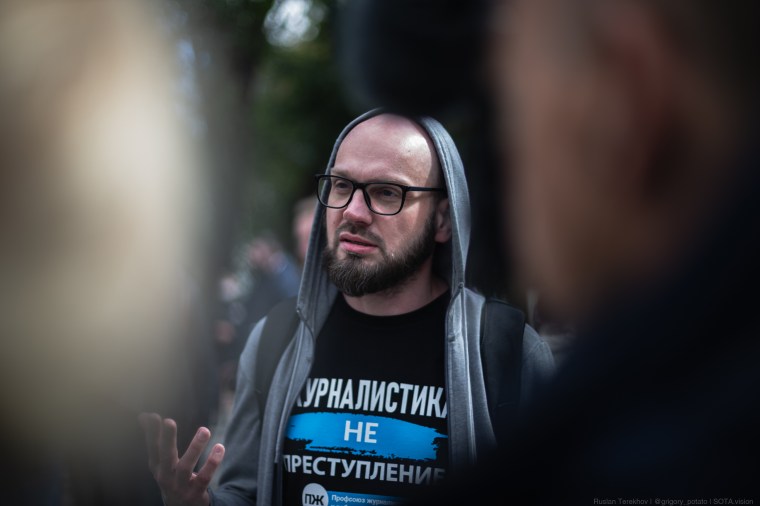As journalists flee Russia fearing prosecution for their coverage of the invasion of Ukraine or their affiliation with outlets deemed “foreign agents,” the country’s Journalists’ and Media Workers’ Union (JMWU) is trying to help them. A non-governmental trade union with some 600 active members, the group defends labor rights, provides assistance to journalists, and stands up for freedom of the press in Russia.
Founded after a 2016 attack on local and foreign journalists in Russia’s North Caucasus, the organization is filling a vacuum in Russia where officials “do not want or do not dare to touch upon unpleasant topics and protect injured journalists,” according to its website. (Another union, the Russian Union of Journalists, has often taken pro-Kremlin stances, recently asking Russia’s media regulator to take action against YouTube for what it called censorship of Russian media.)
On the first day of Russia’s full-scale invasion of Ukraine, February 24, the JMWU published a bold statement calling the war a “perfidious step” that would risk journalists’ lives and “lead to the death of many citizens of our countries and huge destruction.”
CPJ spoke to co-chair of the union, Igor Yasin, about the group’s work to help Russian journalists in this precarious moment. The interview was edited for length and clarity.
What do Russian journalists need most right now? And how are you helping them?
Igor Yasin: We are in touch with many journalists, those who fled and are now abroad, in Istanbul, for example, and those who are still in Russia and are planning to go.
The main need [for journalists who have fled or want to] is visa support but many are also looking for financial assistance. One of the biggest requests we receive from journalists and newsrooms is about digital security, about what to do during the searches of newsrooms, journalists’ apartments, or searches of their devices when they cross the border. They need trainings and consultations.
But there are also journalists who don’t have plans to leave or cannot do so because they have elderly parents to take care of, or for other reasons. In Russia, there are many journalists who have become jobless, and are going to stay. It’ll be hard for them to find a new employment especially if they worked for media outlets labeled as “foreign agents” or “extremist.”
The new legislation punishing the dissemination of “fake” information on the war with up to 15 years in prison has forced many journalists to flee in fear. How do you see that law, plus the ban on the use of words “war” and “invasion” to describe Russia’s actions in Ukraine, impacting Russian journalists and foreign correspondents?
The problem with laws in Russia is that it’s very difficult, if not impossible, to predict how they will be applied. If in the past, we tried, along with media lawyers, to analyze, look at precedents, the legal practice, to understand how new laws would be implemented, now, it is impossible to speak about the future with any clarity.
The laws have often been applied selectively and for the convenience of those in power. So, with these new laws we can’t really predict the scale of the impact of the new law [on “fake” information]. Will it target individual journalists and media outlets, or will there be a blanket use? I cannot tell.
But what is clear is that many journalists decided to flee as soon as they heard about the law or soon after the law was adopted. Just like that – packed up a few items in a suitcase and took off. Journalists with dual citizenship fled – journalists whom I know personally. Some who are Russian citizens but worked with reputable foreign news agencies also fled.
Are you planning to go too?
I wouldn’t like [to leave Russia]. I continue working as before, even more than before, with the new flood of requests for help. We haven’t faced pressure yet — maybe because we are not the most important organization that bothers [the authorities], maybe they think we are too insignificant, maybe it’s just not our turn yet. But we expect anything at any moment.
Your February 24 statement was very brave, but not unusual given your organization’s history of standing up for journalists. Are you going to be more careful from now on?
You are right, we have always had this kind of position. But if you recall, when [the war] started, there were many similar statements. We were not the only ones to condemn [the war]. But everything developed so fast. In a matter of days, the [new law on “fakes”] was initiated, adopted, signed into law, and went into force.
So, when the law on “fakes” [was adopted on March 4], we discussed internally whether we should take the statement down, but we decided against it. We just removed signatures under the statement to protect people who signed it.
What else changed in your work since the beginning of the war?
I now have to use a VPN [virtual private network] for everything and safe messaging apps for phone calls and messaging. I had to learn how to navigate to stay safe digitally.
